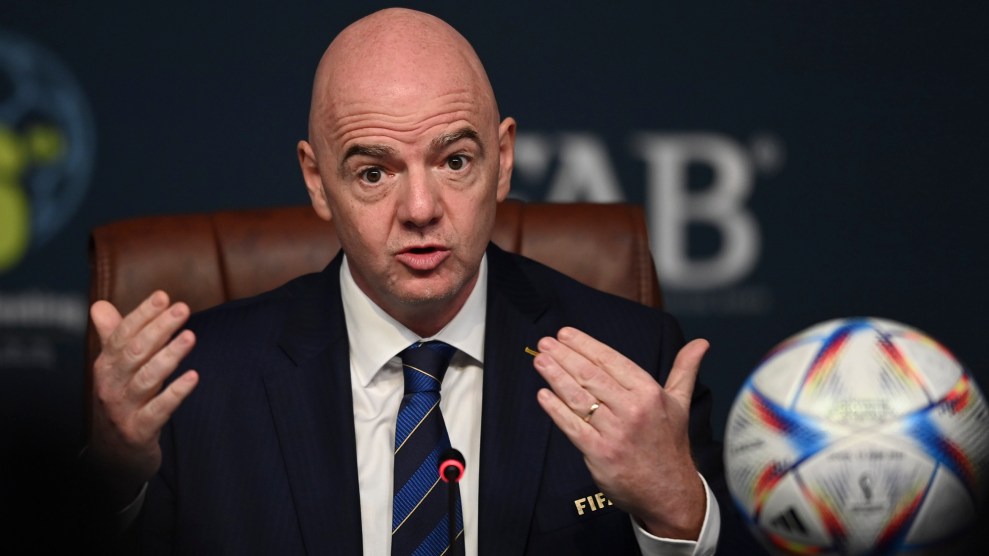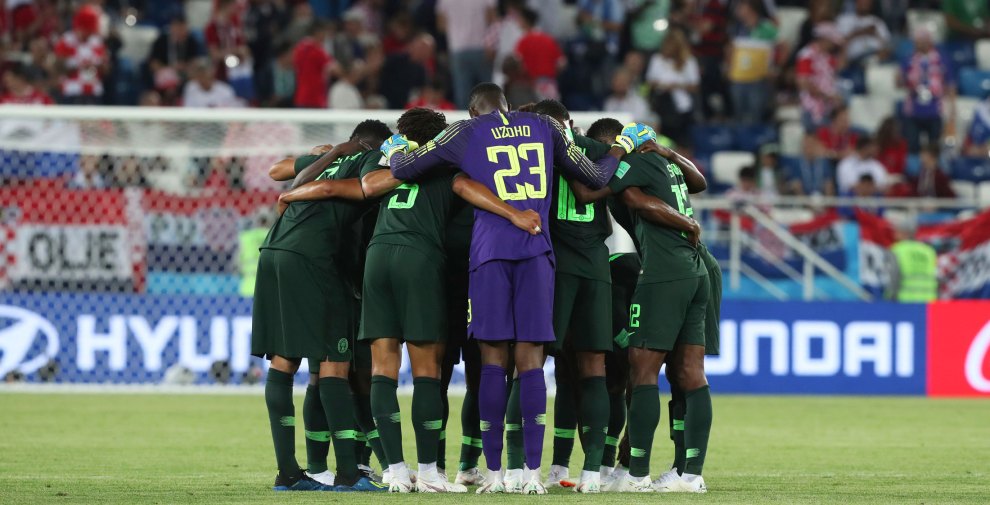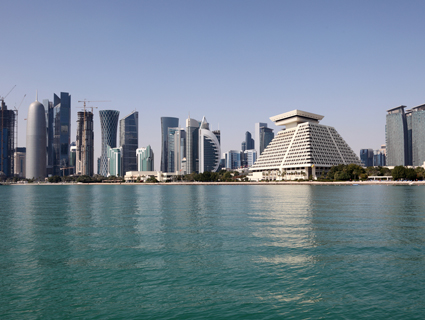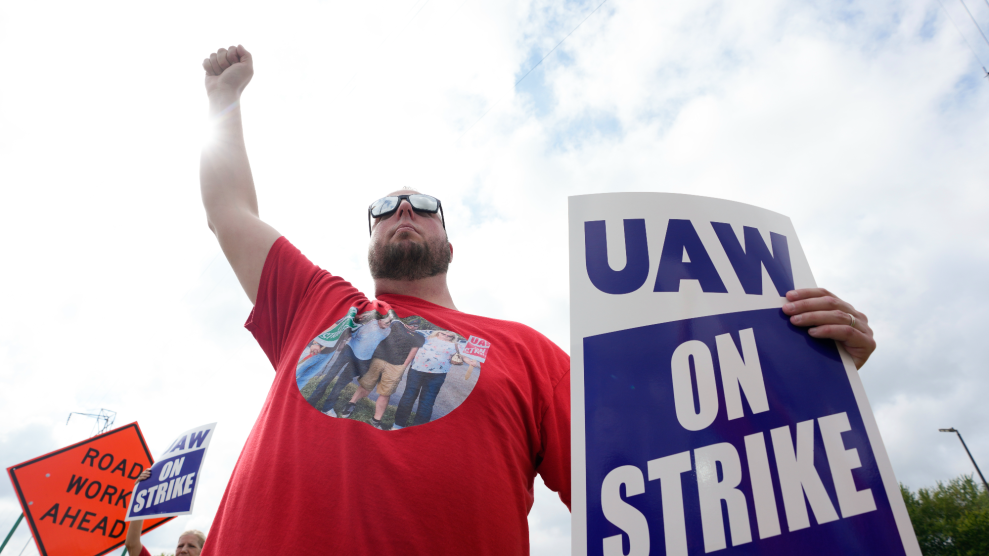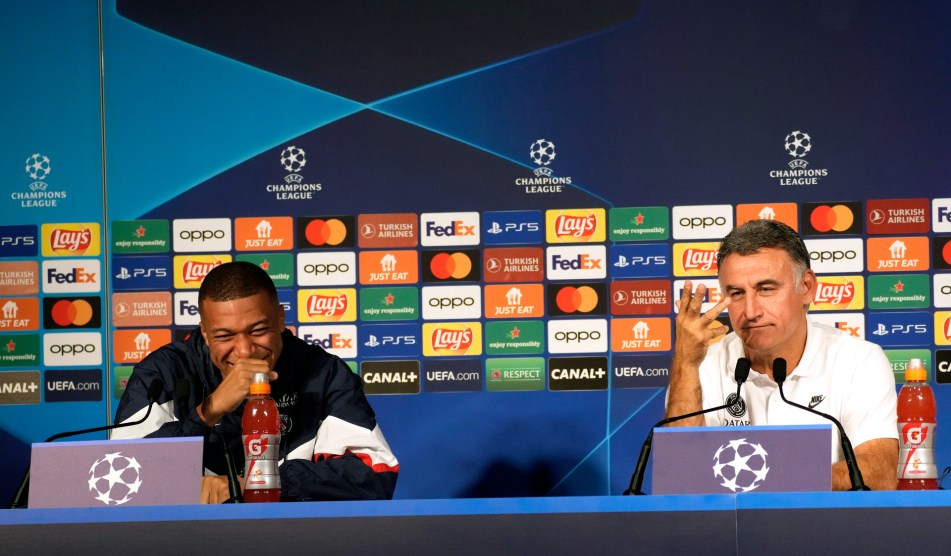
PSG's Kylian Mbappe, left, and PSG's head coach Christophe Galtier, right, laugh about the idea of taking a train.Thibault Camus/AP
Here is a neat encapsulation of a common approach to climate denial.
At a press conference on Monday, a reporter asked the coach of Paris St. Germain—one of the largest soccer clubs in the world and one funded by Qatar—about the club’s decision to take a private jet the 240 miles from Paris to Nantes. The coach, Christopher Galtier, looked at Kylian Mbappe, the star of PSG seated beside him, and they exchanged glances like two smirking boys in church. Then, Mbappe laughed. Mbappe folded over laughing, his head almost hitting the table. Galtier giggled.
The coach then brought the press in on the joke and said, “This morning we talked about it with the company which organizes our trips and we’re looking into traveling on sand yachts.”
Ha-ha.
La séquence dans son intégralité est encore pire.#PSG #Galtier #mbappé #jetprive pic.twitter.com/wYqjYD9j3G
— Antoine Llorca (@antoinellorca) September 5, 2022
The clip spread. Mbappe and Galtier have been chastised to take the crisis more seriously. Of course, despite the chuckles, it is not ridiculous to ask if a train would be more appropriate, not to mention efficient. Nantes is less than two hours to Paris by rail. In an hour, a private jet can emit—according to the Washington Post—2 metric tons of CO2; a typical US car emits 5 tons in a year.
And yet why did even asking the question to Mbappe and Galtier provoke such laughter?
On one hand, the barely mad scolds among us, like French Finance Minister Bruno Le Maire, can criticize them for their lack of gravitas at the “least opportune moment.” You can say they did not know better. It was all a mistake. Move on. Consider the train, mes amies?
But that misses a much larger point. That laugh inadvertently reveals a great deal about what it means to think about the drastic changes in our lives as the world copes with catastrophic climate change.
PSG is owned by Qatar, the largest natural gas producer in the world. The funds controlled by the state have generated money from energy trades to not only fund a country but also to buy the biggest club in France and lubricate talks with FIFA, allowing the country to host a World Cup in the winter so the games could be played in and around its capital Doha. The only reason Qatar is a geopolitical power is because it profits from an energy system that causes climate change. Add to that, the pervasive and overwhelming power of the super rich. A petro-state buying a club and making it so affluent that it travels like Kylie Jenner to go across town is the perfect distillation of how the literal jet set has embraced a new cult of climate-denying.
What Mbappe and Galtier have accidentally but correctly intuited is the idea of asking the likes of them to take a train is a farce. The reason they don’t travel by train is completely logical, it is absurdly logical, it is laughably logical: They don’t have to. In fact, they don’t have to do anything they don’t want to do—greater good be damned. It’s one of the many benefits of being loaded: To live free.
And that, for me, is the more relevant version of climate denialism. Corporations, the wealthy—and, let’s face it, even the rest of us—hope that a warming world will not have to lead to any actual change structured as a demand on our lives. Did PSG ever consider taking the train? No. Of course not. They will have to be forced.
As always, we will be told it is illogical—or ridiculous or not pragmatic—to dream of the rich and the powerful altering their actions when others, with far less, make multiple sacrifices without a choice. And so this lesson is broader. The laugh is just the highly rarified version of a New Jersey investment banker fighting congestion pricing in Manhattan so he can drive at only a social cost, not a personal one. You don’t have to argue with “the science,” to diminish the fact that the result is the same: A denial of the realities of human behavior causing climate change.
Sure, the older version of denialism endures, the version that insists on believing away the coming harm by suggesting that there is no harm at all. The classic performance by Sen. James Inhofe (R-Oklahoma) holding a snowball in 2014 sums it up. He’s explaining that, actually, it isn’t getting hotter at all.
But Inhofe’s gag, and ethos, can be pushed away through data, spreadsheets, graphs, and articles noting “experts agree” that climate change is getting bad. There is a scientist ready to say no. There is a flood on the news.
The assumptions of Galtier and Mbappe and PSG generally are not so easily changeable. The denialism on showcase Monday is not one that can be disproved.
Which is to say that laugh I think can stand in for so much naturalization. It can substitute as a broader assumption that we all must change as a the warming planet causes havoc, but within the winnowed parameters of our unequal world. Don’t be crazy. PSG is not taking the train.
Let them fly jets—and eat the world, too.


